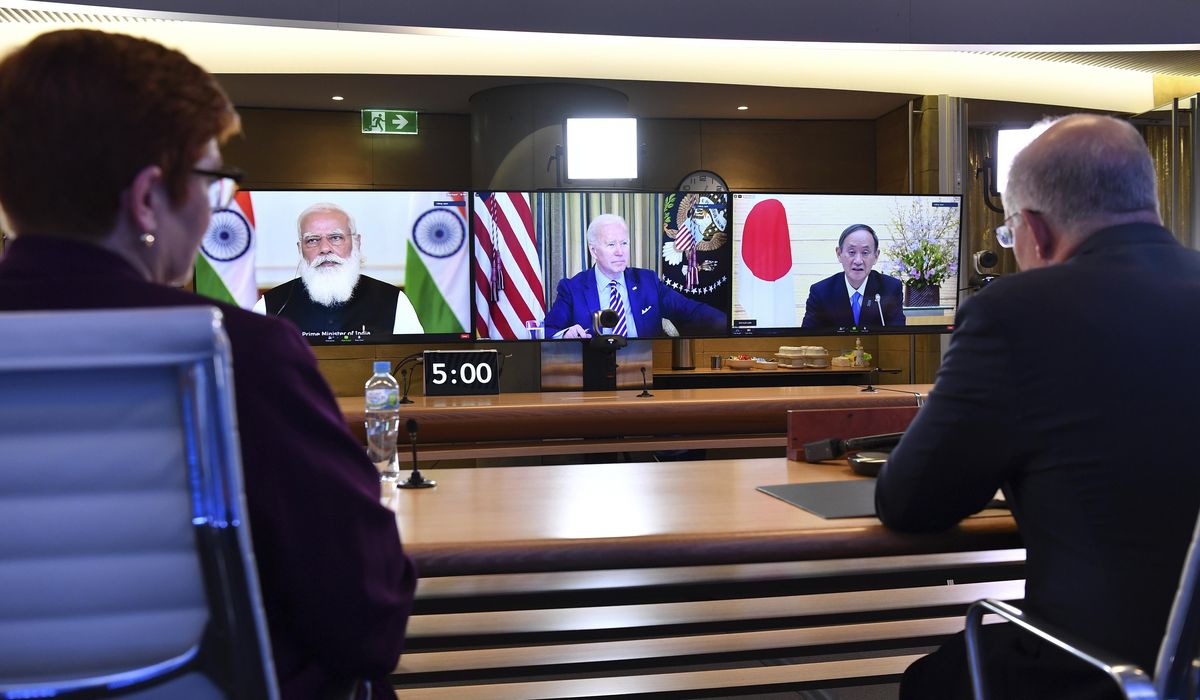
U.S. efforts to forge a new formal alliance of major Pacific Rim democracies to counter China are set to take a step forward at the White House on Friday, as the heads of state from the “Quad” powers gather for the first in-person summit of the strategic alignment that has triggered increasing frustration in Beijing.
Building on a diplomatic push first launched in the Trump administration, President Biden will host the leaders of India, Japan and Australia as part of what is formally known as the Quadrilateral Security Dialogue, an ongoing effort to rally the most powerful democracies of the region into a more formal grouping to confront communist China‘s expanding economic and military influence on the world stage.
Beijing has been bristling at the effort for months, with Chinese President Xi Jinping warning in a speech back in January that U.S. attempts to rally the world against China risk sparking a “new Cold War.” The Quad meeting comes just days after Mr. Biden unveiled a separate new alliance with Britain and Australia, anchored by a deal to supply U.S. technology to Canberra to power a new generation of nuclear submarines.
Japanese Prime Minister Yoshihide Suga, who is leaving his post in a couple of weeks, broke with the tradition that Japanese lame-duck leaders do not make major foreign policy trips in order to attend the White House gathering. A senior government official told the Kyodo news service Mr. Suga decided to go “to ensure the Quad framework becomes a fixture” even after he departs.
For Indian Prime Minister Narendra Modi, whose participation is widely seen as vital to the Quad’s success, the Washington trip will be his first foray outside of South Asia since the COVID-19 pandemic began. Australian Prime Minister Scott Morrison, who just engineered a major trilateral security pact with the U.S. and Britain, will also attend.
While Mr. Xi made no mention of the Quad in remarks this week to the United Nations, pro-Communist Party commentators haven’t held back, with Chinese state media calling the Quad a “sinister gang” and warning Japan, India and Australia will become “cannon fodder” if they too eagerly follow the U.S.
Trying to play down the security aspect of the gathering, Biden administration officials say Friday’s summit will focus mainly on logistical coordination around the global COVID-19 vaccine push. But the Chinese government is clearly more worried about expanding security implications of the Quad and the general tightening of diplomatic ties among Indo-Pacific democracies in response to collective fears of Chinese economic bullying.
Like Washington, Canberra, New Delhi and Tokyo have all seen rising tensions with Beijing, even as their economies remain tightly tied to China‘s vast industrial base and consumer markets.
“The purpose of the Quad mechanism is to encircle China,” warned the lead editorial Thursday on the website of the Chinese state-aligned Global Times newspaper. “If Japan, India and Australia went too far in following the U.S. strategy of containing China, they will become cannon fodder as China will resolutely safeguard its interests,” two Chinese analysts wrote.
The reality is that the Quad has become a “regular feature of the diplomacy in Asia” and “the Chinese hate it,” said Michael J. Green, a National Security Council Asian affairs director in the George W. Bush administration now at the Center for Strategic and International Studies in Washington.
Friday’s summit, meanwhile, comes on the heels of last week’s announcement of a new U.S.-Australian-U.K. security pact that many see as a parallel effort to counter China. Analysts say the two initiatives underscore desire among the world’s leading democracies to respond more robustly to Chinese economic and security rise, its aggressive sovereignty claims against its many smaller neighbors, and its drive to hold up the Chinese authoritarian model to developing countries as more stable and prosperous that Western-style liberal democracy.
Unease and momentum
Unease has also been rising for months over growing provocations by the Chinese military against Taiwan. On the eve of the inaugural Quad summit, China sent 24 fighter jets toward Taiwan on Thursday in a large display of force after the self-governing island announced it would apply to join an 11-nation Pacific trade group that China has also applied to join.
Mr. Green told journalists on a conference call this week that there are a number of reasons for the momentum of the Quad.
Mr. Xi “has taken a much harsher line towards his neighbors, with violence against Indian troops in the Himalayan Mountains [and] a pronounced increase in military and paramilitary operations around Japan’s waters,” he said. Beijing has also engaged in “a relentless embargo against Australia of exports of everything from wine to coal because of the Australian government’s … criticism of China’s human rights.”
“So there’s an urgency to the Quad now,” he said. “It has become really one of the most important parts of the diplomatic tool kit for these four countries.”
Former Australian Prime Minister Kevin Rudd has offered a similar assessment, saying China‘s provocative behavior has finally pushed other countries to draw a line.
“The Quad is uniquely problematic for China’s strategy because its aim of unifying a multilateral coalition of resistance has the potential to stiffen spines across the whole of the Indo-Pacific and possibly beyond,” Mr. Rudd, who is now the president of the Asia Society in New York, wrote last month in Foreign Affairs.
“For Xi, the critical question is whether the Quad will evolve to be large, coherent and comprehensive enough to effectively balance against China, thereby undermining any sense that its dominance, in Asia or globally, is inevitable,” Mr. Rudd wrote.
Mr. Rudd suggested concern among Chinese leaders has risen as lawmakers in Washington have aligned behind more aggressive U.S. policy toward Beijing, critical of China‘s human rights record, its squelching of democracy in Hong Kong and its mishandling of the early days of the COVID-19 virus and its secretiveness about how the virus originated.
Beijing‘s concern, he wrote, is that efforts like the Quad could derail what he described as Mr. Xi‘s desire over the coming 15 years to make China the world’s “top economic, technological, and potentially even military power” and “begin rewriting the rules of the international order — and entrench its global leadership position.”
Patrick M. Cronin, the Asia-Pacific security chair at the Hudson Institute in Washington, said in a recent interview that he believes Mr. Xi has encouraged the Quad momentum by embracing an offensive foreign policy.
“The fear that Taiwan could get whipsawed by China and that other regional actors, such as the Philippines and Vietnam, could be bullied by China has the Quad leaders wanting to help,” he said. “They want to do something about it to help insulate Southeast Asia from China’s bullying and coercion.”
“The point here,” he said, “is that perception of the ‘China threat’ has dramatically risen in the eyes of New Delhi, Tokyo, Canberra and Washington in recent years.”
Mr. Suga told Bloomberg News in an interview this week that “the changing power balance brought by the rise of China in the Indo-Pacific, along with the increasing inward focus spurred by the pandemic, have increased uncertainty,”
Despite promoting the Quad, Biden administration officials have sought to avoid provocative rhetoric in public over the initiative. A White House statement announcing the summit of Quad leaders made no mention of China. Mr. Biden in his U.N. General Assembly address earlier this week also avoided a direct attack on China and said at one point, “We are not seeking a new Cold War or a world divided into rigid blocs.”
The White House statement said that the Quad leaders “will be focused on deepening our ties and advancing practical cooperation on areas such as combating COVID-19, addressing the climate crisis, partnering on emerging technologies and cyberspace, and promoting a free and open Indo-Pacific.”








